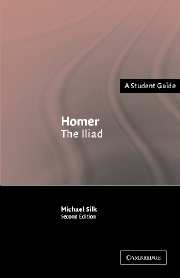3 - The Iliad and world literature
Published online by Cambridge University Press: 05 June 2012
Summary
The after-life of the Iliad
It would be a formidable task to attempt a full account of the ‘after-life’ of the work that inaugurates Western literature. That would involve relating the poem to its many changing interpretations, assessing its use to the Western literary tradition over three millennia, and placing it against all the poetry and prose in many languages that descends from it indirectly. Nor could such an account be a coherent one. For example, part of the use that the Iliad was put to in classical Greece – represented, for instance, by its influence on Greek religion (p. 26) – belongs to the history of ancient culture or ideology rather than to literary history in the modern sense. Then again, much notable interpretation of the poem has focused not on its literary significance, but on its technical features or its hypothetical genesis. This is particularly true of ancient Alexandrian scholarship and of the work of the last two centuries in the wake of Wolf, then of Milman Parry (pp. 8, 14ff.). By contrast, the readings characteristic of the Renaissance and the Enlightenment, from the sixteenth century to the eighteenth, present the Iliad specifically as literature, but literature in the perspective of Rome: they usually take the form of theories of epic which acclaim Virgil's Aeneid and critiques of ‘Homer’ (meaning Odyssey as well as Iliad) which bemoan Homer's failure to anticipate Virgilian norms.
- Type
- Chapter
- Information
- Homer: The Iliad , pp. 93 - 98Publisher: Cambridge University PressPrint publication year: 2004

